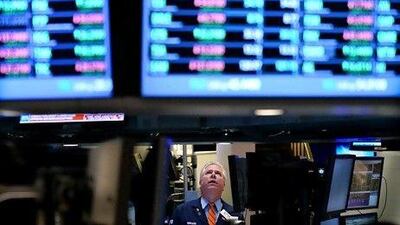The year started with encouraging economic data in the United States. In the European Union, massive central bank support lowered sovereign yields and spreads, unfroze interbank lending, and reduced risk of disorderly defaults in the banking system. China and emerging markets slowed but did not have a hard landing.
With valuations below historical trends, risk-aversion declined. For the first time in decades, the earnings yield (annual profit divided by price) on the Standard & Poor's 500 index rose above 7 per cent, about 5 per cent above the 10-year rate for US treasuries.
Also, more than 40 per cent of the stocks in the S&P 500 Index yielded more in dividends than the treasuries rate in interest.
Investors' confidence rose and the hardest-hit assets became sought after. In emerging economies, short-term portfolio-flows chased high-yield assets in Asia and Latin America.
Quickly, liquidity galvanised the attention of investors seeking higher returns. Although thinly traded, global equities and commodities surged.
For the rally to last, a healthy global recovery and rising company earnings are needed. But instead, the whole world is slowing.
The US economy is showing signs of deceleration and could enter a soft patch.
Consumers are cautious. Europe is sliding into recession. China and India are unlikely to inject a sizeable stimulus into their economies.
Growth will remain challenged.
In advanced economies, household, financial-sector and public-sector deleveraging, spending cuts and reforms are needed and upcoming. Fiscal consolidation will accelerate disinflation, and - as buyers anticipate lower prices - consumption will decline.
"Tail risks" - low-probability, high-impact events that could have systemic consequences via negative feedback loops - could materialise, hampering the real economy and investor confidence. Indeed, global unemployment affects 200 million people (up 27 million since the start of the crisis) and could spark unrest.
The Arab Spring turmoil and Iran's nuclear ambitions may cause further friction. The euro zone's democratic deficit, rising sovereign risks and ongoing debt restructuring - where a Greek deal is likely to lead to a Portuguese one - are sources of stress and possibly contagion.
Policy mistakes, due to wait-and-see attitudes or political deadlock, could induce a recession. Banks, in need of capital and allergic to regulatory reform, will foster financial sector jitters.
Global politics look challenging, with presidential elections coming up or already held in the US, Russia, Yemen and Venezuela; parliamentary elections in India, Iran, Libya, Jordan, and Tunisia; the leadership transition in China; and North Korea's succession. Pakistan and Afghanistan could also contribute to geo-political instability.
As a result, corporations are on hold, lacking confidence to make significant business and investment decisions, since sales, profit margins and corporate earnings might suffer. The market seems to have moved ahead of fundamentals, and a correction looks likely.
Because of excessive liquidity and high uncertainty, stock markets are likely to remain highly volatile this year.
Investors might focus on news and events rather than longer-term trends. Given the slow-growth, disinflationary outlook, a fast reversion to the mean of returns is improbable. Indeed, stocks could be cheap because they discount a deflationary trend, as has happened in Japan.
Taking fundamental directional bets is likely to prove disappointing. Earnings growth will soften, especially in emerging markets. Financials are likely to suffer.
Investors will privilege strong balance sheets and value. Income-producing multinational brands will do well, as a significant share of their revenue comes from emerging markets. Small luxury companies, healthcare providers and the consumer sector are likely to generate returns. US stock markets are likely to outperform.
Core sovereign bonds - from the US and Germany - might benefit from risk-off episodes, slowing economic growth and a reduction in long-term interest rates.
Still, in the absence of systemic shocks, high-yield corporate credit might perform well and emerging-country bonds denominated in local currencies could deliver even higher returns. Inflation-linked bonds show more risk than returns.
The unfolding of the euro-zone crisis and the ongoing monetisation by the European Central Bank should weaken the euro. If a tail risk materialises, investors will retreat to the US dollar, still the world's primary trading and reserve currency and a global haven. The Swiss franc is likely to maintain its purchasing power.
With respect to the past decades, investors face a very different, and more difficult, investment environment.
The probability of future financial shocksis high, and capital preservation via a defensive asset allocation is a priority. During the next couple of years, cash could work as both an insurance against sharp downturns and the required seeding-capital to quickly seize opportunities.
Still, in the longer run, keeping liquid portfolios will result in low returns. Illiquid assets, such as private equity and property are to be considered, but only if fully understood and professionally executed.
In a few years, looking back to this period with the benefit of hindsight, it is likely that unusual portfolios - less liquid and more volatile - will perform better than conventional ones.
Alessandro Magnoli Bocchi is the chief economist and serves on the management team and the investment committee at Kuwait China Investment Company

